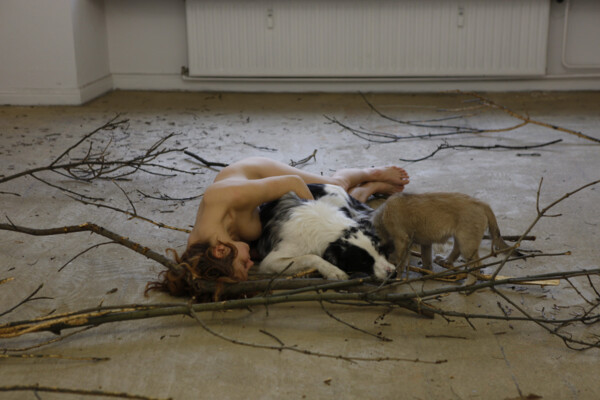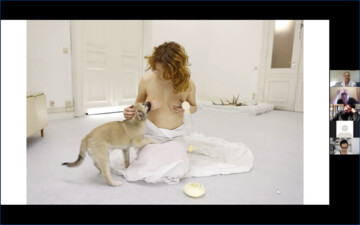I will try to address the term mOther(ness) that arose during a practice-based artistic research executed over the course of a few months when preparing my body for lactation. It culminated when I gained colostrum and breastfed a canine puppy in a public performance titled Hybrid Family in 2016.
Even though my artistic practice is usually guided by intuition, I start from the premise that we are all colonised by bacteria and viruses. Just as we humans colonise houses, cities and surroundings, we also serve as hosts for ideologies, media and technologies. The term holobiont, coined in 1991 by the biologist Lynn Margulis, for example describes all life on → Earth as an entire organism permeated by the biosphere. The concept of holobiont breaks the self-understanding of individual life, connects humans in a symbiotic way with other organisms and disrupts the division into subject and object. Furthermore, the social and personal paradoxes that were revealed by the COVID-19 pandemic made people aware, as maybe never before, that life is above all about many of those other than human entities.
Even though Margoulis’s ideas have been inspiring me to think beyond the anthropocentric view for years, I would like to explain my parallel observation of our civilisation’s zeitgeist which has been bringing me to a place that is far from being a happy one. For quite a while I have been observing the global social reality and many challenges that society has been struggling with, through some kind of a thanatopolitical dimension: in the face of disappearing natural resources and the increasing demand for them, the global migration flows, refugee crisis, ever-growing populisms, overpopulation and consequently threats to biodiversity, all evoked by a proto-fascist globalised capitalism that seems to pursue its path of destruction until everything is consumed, I have been trying to explore, through my artistic practice, the so-called art of living on a damaged planet and the possibility of life in these capitalist ruins. I have been further dwelling on the writing of Rosi Braidotti, who addresses the myth of humanity, which has been based on universal values and human exceptionalism, always excluding some that didn’t correspond to the ideal which underlies the apparent universalism. “There have always been fine gradations within the category of the human, according to gender, race, class, culture, nation, religion, even species; and so on. Therefore, not all of us could say, with any degree of certainty, that we have always been human, or that we are only that.”[1]

Maja Smrekar and Manuel Vason, K-9_topology: Hybrid Family, Berlin, 2016. A photographic series from a durational performance. Produced by Freies Museum Berlin (DE) and Kapelica Gallery (SI). Courtesy of the artist.
While feeling the need to twist boundaries than could no longer withstand this myth of humanity, and while trying to find the possibility of a new language that goes beyond our symbolic distance to the world, some of the following questions emerged: How to particularise my own motherness within this context? What are the alternative forms of coexistence? What is the alternative relationship between me and the other?
An attempt to answer these questions lead me to think beyond the laws of genus and species or race or gender, and it became clear to me that I needed to come up with a construction that needs to happen on a (micro-)political level and therefore on a molecular one. Accordingly, I adopted a microperformative method to employ → empathy towards the non-human other as a training to possibly achieve (more) empathy for a human other. And so I decided to feed humanity’s longest non-human companion by far – the dog – with my own milk.
Within a residency apartment at the Freies Museum Berlin, I established a practice based artistic research platform to compose a methodology by following a process of preparation in 112 days of seclusion – this started mid-October 2015 and lasted until the beginning of February 2016. The process included psycho-endocrinological training: a diet of iron-rich food and hydration by galactogogue liquids that promote lactation. Alongside this, I prepared physiologically by using mechanical breast-pumping: 8 x per day – every 3 hours for 20 minutes. The act of breast-pumping carried the impulses to the neuroendocrine cells of my hypothalamus, through the nerve receptors in my breasts. Consequently the hormone oxytocin, that as a side effect causes empathy, was released to be transported by the blood to my mammary glands, further releasing the hormone prolactin, which stimulated milk production. I thus executed the same strategy as some mothers-to-be, or others who are about to adopt a still nursing baby. But most importantly, this method of prolactin acceleration does not need to include the ovaries and uterus, so it can be executed no matter what gender, as it is not only connected to pregnancy. Colostrum started to occur after eight weeks; right when I adopted a puppy whom I called Ada. In the public presentation which took place in the form of public visits in my studio, the visitors could witness the feeding of a puppy with colostrum while drinking galactogogue herbs tea and discussing reproductive freedom in a heteronormative society as well as the anthropocentrism as its consequence.
I was by these conversations and by my whole experience further drawn to think within the discourse of Donna Haraway, who poses the question What is feminist reproductive freedom in a dangerously troubled multispecies world? My conclusion was the following: just because I don't have children, that doesn't mean I do not have maternal instincts. Those are a part of being human and other than human, not just a part of being female. Furthermore, the microperformativity of the two hormones produced by breast-pumping and later by breastfeeding, that were increasingly expressing as a feeling of empathy, became the ultimate point of departure for Hybrid Family, whereas by being pregnant with a concept of abundance, I became the Other as a mOther.
Therefore, motherhood should not be reduced to parenthood but should be expanded to interpersonal relationships on a large scale. It should become a concept of → solidarity in co-creating our responsible futures among humans and other-than humans. I therefore conclude by employing Hybrid Family’s molecular discourse: it has been well recognised that the hormone prolactin ensures not only survival of the species through its reproductive role, but also survival of the individuals of many species in its homeostatic roles. That being the case, I call and welcome (women of) all genders to (continue) breastfeeding!


![Subjectivisation 2 [Discussion #1]](/website/var/tmp/image-thumbnails/0/1462/thumb__logo/Discussion-1.png)
![Subjectivisation 2 [Final discussion]](/website/var/tmp/image-thumbnails/0/1478/thumb__logo/Mick-final-discussion.png)
